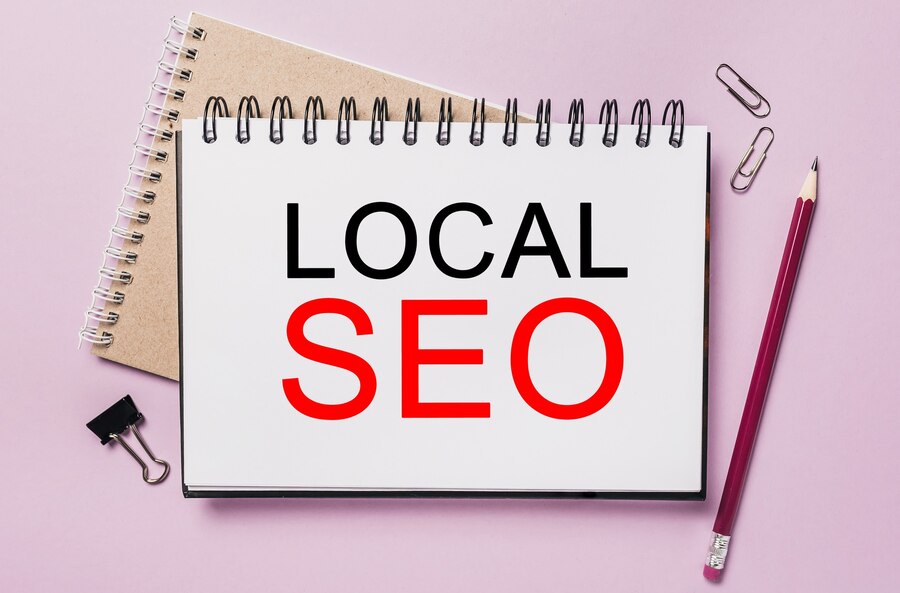Is Drupal the right CMS for your B2B website? Here’s how to decide
Jun 23, 2025

Jun 23, 2025

Jun 23, 2025

Jun 22, 2025

Jun 20, 2025

Jun 20, 2025

Jun 19, 2025

Jun 18, 2025

Jun 18, 2025
Sorry, but nothing matched your search "". Please try again with some different keywords.

If you type on your phone, ‘where to order chicken biryani,’ the result won’t likely show the location of top-rated Indian restaurants all over the country. What your search engine will show are Indian restaurants close to your location.
That’s the local search engine optimization (SEO) at work. And as 46% of searches are local, this means that if your business isn’t optimized for local SEO, you’re missing out big time.
Local SEO means increasing a business’s visibility in its geographical location. It seeks to make a business’s search engine result pages (SERPs) rank high in local searches. Local users easily find a company with optimized local SEO.
Local SEO ensures that people near you—your potential customers—will find your business. Ideally, you want your business to appear in the top three results of users’ local searches. Read on and find out how you can do this.
So, how can you rank higher than your competitors in local searches? Below is a discussion of the four stages of SEO for local businesses:

A good first step to boosting your local SEO is to set up your Google Business Profile (GBP). This step alerts the search engine of your business’s presence in the area. Claiming your GBP enables you to add detailed information local users may find helpful. You can optimize your Google Business Profile by adding the following:
Ensure that users can contact you by providing your numbers and your website. That way, you can reply to inquiries promptly. For example, if you’re a general contractor, you can use software from Jobber to help you answer customer queries quickly, especially if clients contact you and ask about cost estimates.
If your business is listedinGBP, establish yourself as its owner. If your company isn’t listed, you can add your business to the GBP listing and get yourself verified.
Depending on your business, you can post photos of completed jobs or your employees at work. If your business is a restaurant, you can add pictures of your menu, meals, price range, and special events or information like your restaurant’s atmosphere(whether formal or casual). This estimate template can also come in handy for customers asking for quotes or sample rates.
Information like this can help customers decide whether your business is what they want. Your customers will also know what to expect when they visit you.
Besides the standard website optimization, you also need to optimize your website for local SEO. First, create a dedicated Contact Page on your site. Local users prefer businesses that provide detailed information that’s easily found. Make sure your contact page displays your ‘NAP:’
Also, don’t forget to show your email. If your business has other locations, add their names, addresses, and phone numbers in your site footer. It will also be an advantage if you make your phone numbers clickable. This feature helps in optimizing your site for mobile devices. Remember, more than 60% of mobile searchers prefer a mobile-friendly website.
Since you want local users to find you, add a map on your website showing your exact location. You can also add a few local customers’ testimonials on your website. Collect a few and display them prominently. Testimonials assure people that you’re a legitimate business.
Your website’s content is essential for your overall SEO. For local SEO, a local connection is vital. And since your target audience is ideally within a few miles of your location, your content should appeal to your local community.
Content is always a critical ingredient. However, content isn’t just limited to news, landing pages, or evergreen content. You should also include blogs and articles with locally relevant keywords and topics.
Create content that aligns with local user intents, not just about your products or services. You can also build relationships with other businesses with related blogs in the area. Having a relationship with other companies can establish your site in the community and be a start to link-building.
Moreover, your content should be helpful to users in your community. Doing these allows Google to connect your content’s semantic relationship with local search intents. This connection could help increase your SERP ranking and land you in the top three spots of local searches.
It starts with you providing quality products or services to your local community. It’s fine to encourage clients to post reviews, but make sure they have something nice to say. After all, 81%of users check a business’s ratings and read reviews.
Positive reviews can make your business stand out in search results—they’re always featured and appear prominently in local searches. However, you won’t always get positive reviews, no matter how amazing your products are. When that happens, be sure to handle them graciously. Be empathetic and focus on what you can do.
Positive reviews are vital, but how you respond to a negative review can be important, too. A study shows that 90% of people are impressed by owners who give polite and thoughtful responses to negative reviews. This action means you can turn a negative into a positive.
Optimizing local SEO means your business will be among the top results for local searches. You could improve your business’s local SEO by following the stages discussed in this article. First, make your presence known in your community by setting up your GBP. Next is to optimize your website for local SEO.
Your site’s content should also be helpful and relevant for local users. Lastly, having positive reviews can make people trust your business. High ratings and commendations from your clients can help you land in the top spots in local searches, helping your business grow more.
Read Also:
Arnab is a professional blogger, having an enormous interest in writing blogs and other jones of calligraphies. In terms of his professional commitments, He carries out sharing sentient blogs.
View all Posts
Is Drupal the right CMS for your B2B website?...
Jun 23, 2025
How To Get Yellow Heart Snapchat Emojis? A Co...
Jun 23, 2025
150+ Video Submission Sites To Work With In 2...
Jun 22, 2025
What Are The Best Shopify Alternatives In 202...
Jun 20, 2025
What Is The Primary Advantage Of Using Genera...
Jun 20, 2025


